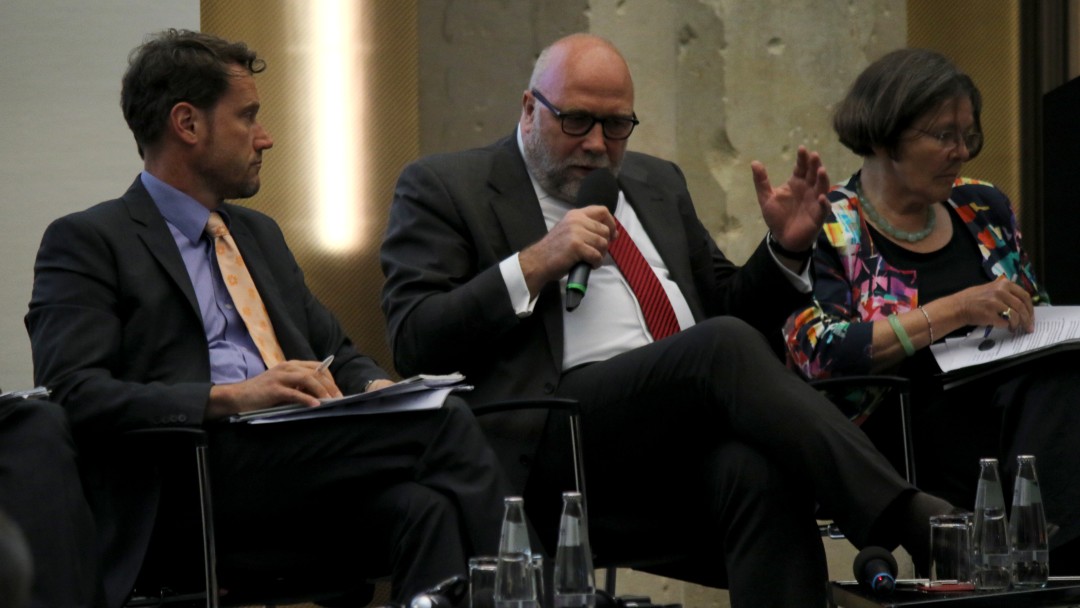News from 2017-06-28 / KfW Development Bank
Well paid jobs for Africa's young people
BAKS and KfW extended an invitation to discuss the future of the African continent

Africa's economic outlook and its migration issues were the main discussion points at the event hosted by the German Federal Academy for Security Policy (BAKS) and KfW at the Berlin-Brandenburg Academy of Sciences in Berlin at the end of May. German Federal Minister of Agriculture Christian Schmidt stressed the importance of keeping food security in mind when fighting the causes of migration from the African continent.
"There is no easy recipe" for Africa noted Joachim Nagel, Member of the KfW Executive Board, who will succeed Norbert Kloppenburg in his duties on the Board in Autumn this year. He stated that the challenges faced by Africa could only be overcome by forming a large international cooperation. The population in Africa is set to double by 2050. Every year, 20 million young people are expected to flood the job market. Yet there are not enough jobs available for them.
Thomas Wrießnig, Vice President of BAKS, stressed the importance of meshing security policy with development cooperation work. This networked approach has been issued in a white paper by the German Federal Ministry of Defence. Moreover, it must be ensured that producers from Africa receive fair access to the European market.
German Federal Minister of Agriculture Christian Schmidt addressed the causes of migration. "Our enemy of old, famine, is still the main cause of migration," he explained. It is necessary to put our heads together, taking into account not only security aspects but also keeping food security on our radar. He demanded the installation of early warning systems so that preventative measures could be introduced in good time before crises arose.
According to UN estimates, 20 million people in Africa are fleeing their homes at present – 75 % of them will find refuge in eight African countries. During an initial panel discussion that called for a critical assessment of the situation, Günter Nooke, the German Federal Government delegate for Africa, explained that the point is not to protect Europe from refugees. The need is to create flourishing economic areas with well-paid jobs.
Reinhard Palm, Head of the Africa Department at Bread for the World (Brot für die Welt), criticised the inconsistencies in government policy. He emphasised the "jostling competition between approaches to Africa" within the German Federal Government.
Eva Terberger, Head of the independent Financial Cooperation Evaluation Unit of KfW, built on the Minister of Agriculture's words. She believes that crisis prevention is more important than crisis management. Development cooperation work has improved considerably in the management of crises, mostly due to the support for local authorities receiving refugees. But much more is needed: effective prevention. There is certainly a great deal of knowledge available on how crises can be managed, but coordination is still lacking. "Everyone appears to be making similar analyses but it seems difficult to get everyone pulling in the same direction."
China's growing influence
The second panel meeting discussed how to find solutions for the challenges posed. Stefan Mair, CEO of the Federation of German Industries (Bundesverband der Deutschen Industrie – BDI), sees Africa as a large, dynamic market but which still requires investment to make it into an attractive location. According to him, the German Federal Government correctly set up initiatives here to promote foreign trade.
Georg Schmidt, Director General for Sub-Saharan Africa and Sahel of the German Federal Foreign Office, forecasts that "without strong commitment from the private sector that takes place on a level playing field, the situation will not move forward."
James Shikwati, Director of the Inter Region Economic Network (IREN) from Nairobi and critic of the classical model of development cooperation, stressed that Europe's prospects must seem attractive to young Africans. He believes that quick and efficient solutions are required, since the world is, after all, no longer eurocentric as his reference to China's Belt and Road Initiative pointed out.
Emmanuel Gyimah-Boadi, Director of the Ghana Center for Democratic Development, contributed the results of the Afrobarometer surveys to the discussion. According to Afrobarometer, the majority of Africans are not at all interested in migrating, never mind leaving Africa. The desire to migrate and improve one's standard of living is, however, attractive primarily for young people under the age of 24. "Development cooperation needs to invest in regional integration and generate local growth," Emmanuel Gyimah-Boadi recommended.
All those involved in the discussion called for greater opportunity to put their ideas together. They regarded greater interdisciplinary exchange and more coordination for cross-party cooperation within Europe and Africa as a necessary means to combat crises in good time and improve the conditions for economic development. Africa's young people play a key role in this.

Share page
To share the content of this page with your network, click on one of the icons below.
Note on data protection: When you share content, your personal data is transferred to the selected network.
Data protection
Alternatively, you can also copy the short link: https://www.kfw-entwicklungsbank.de/s/enzBWrMC.BnbB
Copy link Link copied